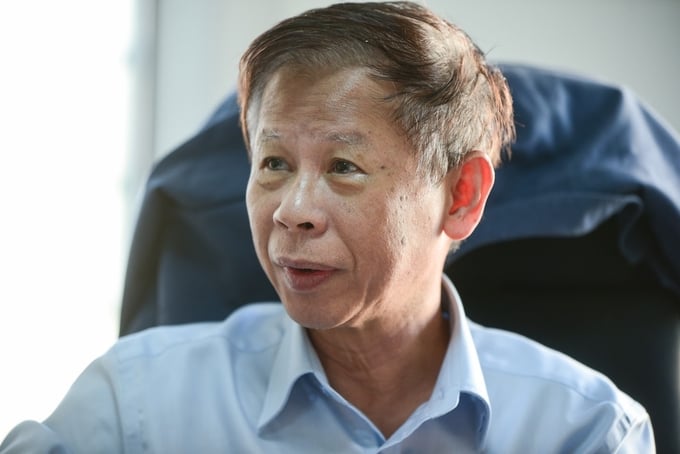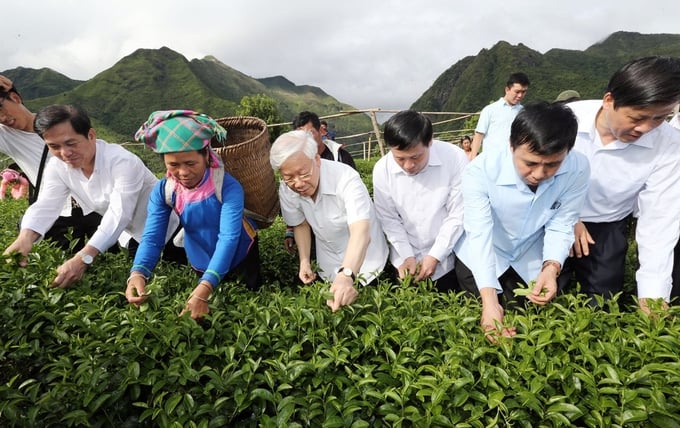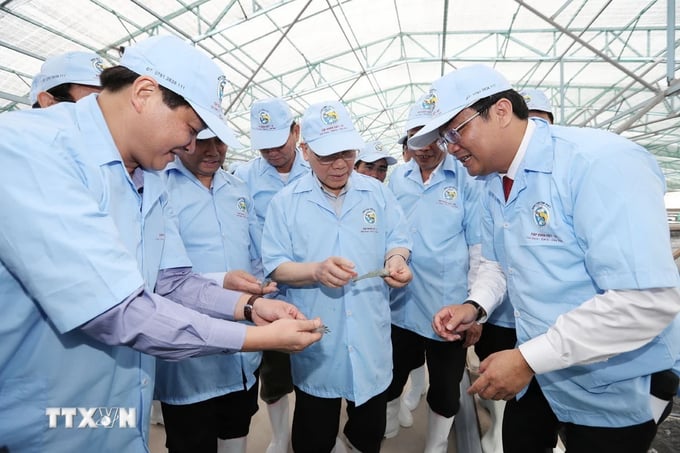June 15, 2025 | 14:38 GMT +7
June 15, 2025 | 14:38 GMT +7
Hotline: 0913.378.918
June 15, 2025 | 14:38 GMT +7
Hotline: 0913.378.918
First and foremost, I would like to express my deep respect for the memory of General Secretary Nguyen Phu Trong. Although he was part of the intellectual generation that grew up and made contributions during the national independence and unity period, his simple lifestyle, sociable nature, and humble approach to the masses made him as close to Vietnamese farmers and agricultural workers as the revolutionary veterans of earlier times.

Dr. Dang Kim Son: General Secretary Nguyen Phu Trong sees national strength in agriculture, farmers, rural areas. Photo: Hoang Anh.
During Comrade Nguyen Phu Trong's tenure as General Secretary, the focus on agriculture, farmers, and rural areas intensified. Many policies and guidelines were issued, directly or indirectly, related to the agricultural sector. Three notable resolutions include Resolution No. 18-NQ/TW on continuing to innovate and perfect institutions and policies, improving the effectiveness and efficiency of land management and use, creating momentum for our country to become a high-income developed nation; Resolution No. 19-NQ/TW on agriculture, farmers, and rural areas up to 2030, with a vision to 2045; and Resolution No. 20-NQ/TW on continuing to innovate, develop, and improve the efficiency of the collective economy in the new period. All three resolutions were issued within a short timeframe and were signed by General Secretary Nguyen Phu Trong.
Each resolution emphasizes two core aspects: new thinking and new solutions. Resolution No. 18 highlights the importance of allowing farmers to convert and adjust land use purposes. Instead of strictly maintaining rice land for food security as in the past, it advocates for diversified production based on market signals, increasing farmers' income and boosting agricultural production's value. It also supports expanding production scales and creating favorable conditions for land accumulation in terms of space, time, and stakeholders. Land resources are managed, exploited, and used efficiently, sustainably, and economically to meet industrialization requirements, ensure national defense and security, protect the environment, adapt to climate change, and drive national development.
With Resolution No. 19-NQ/TW and Resolution No. 20-NQ/TW, the impact of guidelines, policies, and strategies on practice has become more evident and significant. Resolution No. 19 of the Party Central Committee, under the leadership of General Secretary Nguyen Phu Trong, continues to innovate thinking by linking agriculture, farmers, and rural areas into an interconnected whole. This plays a crucial role in the cause of innovation, construction, and protection of the Fatherland, forming a reliable political, social, and economic foundation to protect the environment, adapt to climate change, ensure national defense and security, promote cultural values, and integrate internationally. This modern, reasonable way of thinking underscores the comprehensive role of agriculture, farmers, and rural areas.

For the first time, Resolution No. 19-NQ/TW identifies farmers as the subject and center of agricultural development, rural economy, and new rural construction. Photo: Archive.
In the past, agriculture was seen as a pillar and shield protecting the country during difficult times. However, through synthesizing theory and practice, our Party has put forward significant views in Resolution No. 19-NQ/TW. First, it identifies farmers as the subject and center of agricultural development, rural economy, and new rural construction. Second, agriculture is recognized as a national advantage for the first time. Few industries have received such acknowledgment, shifting the perspective from agricultural production to agricultural economics to leverage national advantages. This modern market mechanism perspective views agriculture as a driving force for national development.
The tasks and solutions outlined in Resolution No. 19-NQ/TW for Vietnamese agriculture are concise and reasonable. The resolution orients the development of practical, ecological agriculture, improving quality, increasing added value, promoting advantages, and applying science and technology comprehensively. The focused tasks also aim to address the weakest points in agricultural restructuring. These include developing plant and animal varieties, mastering animal feed, vaccines, veterinary drugs, fertilizers, and plant protection drugs, thereby creating a proactive position in input materials where we have been weak. The resolution also emphasizes linking agriculture with industry and services, making coordination between production, preservation, processing, and consumption. Industry and services must focus more on serving agriculture, reorganizing production, strongly developing the farm economy, cooperative economy, and enterprises in agriculture, and creating important breakthroughs in both institutions and production organizations.
Regarding rural areas, Resolution No. 19-NQ/TW clearly emphasizes the harmonious development between rural and urban areas, and between industry and agriculture. This is crucial as our country promotes industrialization, modernization, and urbanization. The resolution promptly establishes guiding principles and actions for sectors and levels to propose appropriate development solutions and tasks. It also focuses on key solutions to enhance farmers' role, position, and capacity to master and comprehensively improve their material and spiritual lives. Through the motto 'people know, people discuss, people do, people inspect, people supervise, people benefit,' the resolution aims to create practical livelihoods, income, and on-site jobs for rural workers. It links the development of service industries with agriculture, brings industry to rural areas, and aligns rural development with the urbanization process.

Resolution No. 20-NQ/TW targets the collective economy and supports infrastructure investment. Photo: Archive.
Resolution No. 20-NQ/TW targets the collective economy, which is currently the weakest link among the five main economic sectors: household economy, collective economy, private economy, state economy, and foreign-invested economy. This resolution directs several breakthrough policies from a new approach. First is land, the most challenging issue for the collective economy. The resolution advocates allocating land funds to collective economic organizations for lease at preferential prices and reasonable rental periods to form production chains and provide processing services, thereby consuming large-scale agricultural, forestry, and fishery products.
Second, it supports infrastructure investment to help collective economic organizations serve the common interests of the community and their members or to become hubs for state infrastructure investment projects aimed at community development. Third, it creates conditions for the collective economy to operate internal credit and researches the entrustment of some public services. Additionally, the resolution pilots the formation of highly specialized cooperative federations in various industries and fields to create economic breakthroughs.
These policies reflect a modern and strategic approach to agriculture, farmers, and rural areas, recognizing their vital role in the nation's socio-economic development and defense. General Secretary Nguyen Phu Trong's leadership has been instrumental in shaping these forward-thinking resolutions, ensuring that agriculture remains a key driver of national growth and stability.
With the new thinking and solutions outlined in Resolution No. 20-NQ/TW, the collective economy is poised to become a gateway for the small-scale economy to flourish. This transformation will open a path for tens of millions of Vietnamese farming households to transition to commodity production, enabling a significant portion of Vietnam's rural population to transform into urban residents. Global examples have shown successful transformations due to changes in thinking and policy breakthroughs, but Vietnam stands out as a clear example of miraculous developments in agricultural production and rural development driven by changes in mechanisms and policies rooted in innovative thinking.

Farmers, business people, and agricultural officials will remember General Secretary Nguyen Phu Trong's idea to develop agriculture.
This transformation is a synergistic process combining the will, spirit, and capacity of Vietnamese farmers and entrepreneurs with the Party and the State's creative thinking and determined actions. Developing agriculture, farmers, and rural areas represents a convergence of the Party's will and the people's heart, multiplying spiritual resolve into material strength. Farmers, business people, and agricultural officials are encouraged to proactively harness their internal strengths, innovate creatively, and reform mechanisms to forge a path forward.
The Party, the State, and society at large recognize the strength and potential of Vietnamese agriculture, farmers, and rural areas. From this trust arises policies that correctly address the development needs of these sectors. The resonance between the Party's policies and the people's strength, as demonstrated in historic directives like 'Contract 10' and 'Directive 100,' will continue, leaving a lasting impression on the hearts of the people who trust the Party and its leaders.
Among these leaders, the image of beloved General Secretary Nguyen Phu Trong stands out.
Translated by Quynh Chi

(VAN) The working delegation from the Ministry of Agriculture and Environment conducted an important trip to the Netherlands to strengthen strategic partnerships and sustainable development in the agricultural sector.

(VAN) The letter ‘A Plea from the Ocean’ not only evokes emotion but also awakens the human conscience to the responsibility of protecting life on Earth.

(VAN) The Department of Agriculture in South Africa has announced the country’s first mass vaccination of poultry to prevent local birds from contracting avian influenza.

(VAN) Establishment of the Mekong Delta Regional Agricultural Linkage Center, aiming for a closed value chain, deep processing, trading platforms, and international market connectivity.

(VAN) Gia Lai province has recently recorded 460 rare species of animals and plants, contributing to forest conservation and biodiversity planning in the region.

(VAN) Ms. Caroline Beresford, New Zealand Ambassador to Vietnam, expressed confidence that agricultural cooperation between Vietnam and New Zealand will develop sustainably, be climate-resilient, and promote gender equality.

(VAN) Vietnam reaffirms its commitment to international cooperation in fostering sustainable and responsible fisheries while ensuring resilient livelihoods for small-scale fishing communities.